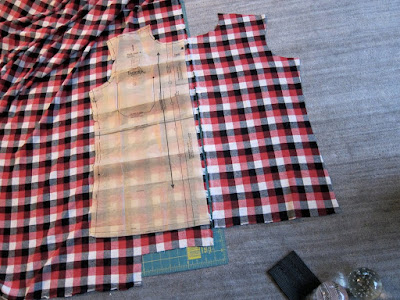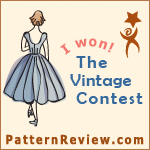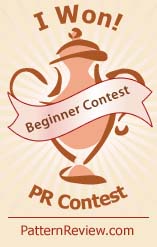
And we're off.
Yesterday I got started on my plaid flannel shirt. I did a lot of online research to see what people were doing with plaid flannel these days -- not a whole lot. The options are pretty straightforward: yokes/no yokes, pocket flaps/no pocket flaps, bias-cut button placket and cuffs/straight-cut button placket.... and so on.
I toyed with the idea of using princess seams (or Viennese seams or whatever they're called for men) in front and I have a men's shirt pattern just like that -- but it was just too much. It might work if I were using a contrasting solid flannel.
I cut everything out and I'm ready to start stitching. I think I'm going to make this one on my Pfaff 30.

Here's how I lined up the plaid for the two fronts (which are two different pattern pieces on this vintage shirt pattern, Butterick 4712).

The facing edges are selvage, but now I'm thinking of using black cotton sateen for the facings as a contrast -- it will look cool where it will be visible (and the inside collar band in the same black cotton).

To avoid screw-ups I carefully labeled my sleeves in chalk on the wrong side. The fabric is the same on both sides, which can cause confusion, especially when I'm making sleeve plackets.

I tried a method I read about on Sherry's fine blog, pattern - scissors - cloth, which is called blockfusing. You interface a big block of fabric and then cut out things like cuffs and collar bands from the interfaced fabric, rather than cutting and fusing each piece separately (as I've always done). This way you know everything will match up perfectly and you won't have to worry about fabric shifting or anything as you fuse. It worked, though with my little iron it's a drag to fuse a big block. Clever, Sherry!

So that's the shirt so far. Snaps or buttons, what do you think?
Friends, look what I found at the flea market yesterday:

Did you know this book existed? I didn't. It's lovely and pocket-sized (for a big pocket) and much more fun to read than the blog. Looking at images on the Internet will never be the same as seeing them in print, I don't think. I love this book. I don't read men's fashion magazines so it's great for inspiration.


Readers, we're out of time. I hope you're getting off to a good start this new year but if you're not, don't forget you can wipe the slate clean at any time and start again -- I do. Don't let the whole New Year thing rule your world.
That said, what's your first project of 2011? Any plaid-matching out there?
Happy Monday, everybody!
















Plaid cotton flannel for hubby is project #3 for me ... so I'll be watching this for tips on matching! Plaid wool for a princess seamed vest is #2 ... with an FBA to complicate it further. As much as I adore plaids, the matching idea is quite daunting.
ReplyDeleteI like your idea of the contrast black facings. Go for it!
ReplyDeleteBecause I'm always afraid chalk will rub off when I mark right/wrong sides, I stick a piece of tape on the wrong sides instead. Of course, this means one needs to remember to remove it when pressing. er....
I thought I would sew something this weekend, but all I did was stare at the walls in my sewing room and sort through presser feet for my old Vikings. I'm waiting for a pattern to arrive in the mail and until it's here, I have no motivation for anything else.
The shirt is looking really good, I really like the pockets. I quite fancy a nice flannel blouse, and I might just make one. Plaid-matching is a little advanced for me, so my first completed project for 2011 has been a pair of leggings. It took me less than an hour to make them and they are so thick and comfy that I'm wearing them now.
ReplyDeleteI have one word of plaid matching advice: BASTING. Basting is your friend. At least it is my friend in past projects. I love the black sateen idea
ReplyDeleteHappy New Year!
I think my first project of 2011 will be to finish the jacket I started in December. Buttons and buttonholes will finish it up but I haven't been able to find the right ones... maybe the new year will bring inspiration.
ReplyDeleteI so admire your ability (bravery) to work with plaids, I have several in my stash but I'm just too darn afraid of them.
Yes, there will be plaid in my life as well. I found a plaid wool blanked at my parents house over christmas that I plan to transform into a cape. Not particularly a spring item but it's just what I want to sew at the moment. I washed it and it shrunk (which I expected) a lot (which worries me now). Instead of matching, the true challenge for me will be the cutting as I worry that I might not have enough material, especially as it also has three little holes...
ReplyDeleteMy vote is for buttons, in a contrasting color like orange or something snazzy. I do so love the bias cut pockets. I noticed those on a shirt a guy was wearing on New Year's Eve and thought it was so clever.
ReplyDeleteI'm glad we can still wipe the slate clean whenever we want. Something I might still have to do.
You are always inspiring Peter. I made a corduroy jean jacket thanks to you. One thing you might want to do is to move the pockets over just a bit from the center to show some white of the plaid. I have never done anything with patterns so I have no idea how hard pattern matching is-looks great.
ReplyDeleteOnly problem with block fusing is that you have interfacing fused to all your seam allowance fabric. Meaning that for your your collar, band, cuffs ect...there is interfacing fused onto the seam allowance fabric. Whereas if you interface the "proper" way, the seam allowances would be trimmed away and the interfacing centered within the piece. This avoids unnecessary bulk in the seams which is especially important on things like the collar band.
ReplyDeleteYou could always carefully peel away the excess and trim it I suppose.
Good point, Anon!
ReplyDeleteyeah well, there are always valid reasons to do things one way or another and it all depends on the context. I am block fusing wool to make a coat. I am copying the exact construction method of a reputable RTW brand. It will be so much faster than doing it using other methods. In this case, I will accept a little bulk on the seams for the speed.
ReplyDeleteIf I had more time, sure - I would apply hymo canvas with hand-stitching, but alas, time is of the essence.
Don't some shirtmakers use sew-in, non-fusible interfacing? I imagine that leaves bulk, too.
I like the buffalo plaid you chose and a black facing will look spiffy.
blockfusing sounds good:)I'll give it a try... the plaid looks good too, looking forward to see the final photo shoot
ReplyDeleteFor the little holes in the blanket, if you're making something dashing like a cape, then scatter some decorations on it, three should cover the holes then more to make it less obvious. Could be little cutouts of birds, cats, leaves in one of the colors, or ribbons, buttons etc. Maybe a band of ribbon?
ReplyDeleteReally like the idea of black sateen for the inside collar band and facing - it will give it a nice individual touch.
ReplyDeleteI'm glad you're trying blockfusing! But please don't credit me, credit the whole manufacturing industry as it is standard practice there. You'll be on the lookout for an Elna-press next!
The idea of fusing before cutting sounds intriguing, but wouldn't a lot of fabric and interfacing be wasted that way? And I've had problems with getting a large piece of interfacing completely fused...
ReplyDeleteFor first project, well, mine was put on hold due to the fact that Evie grew and I have to wait until the 15th to get more fabric because fabric.com is the only outfit that carries it ATM (Joanns ran out and isn't ordering any more) and they won't have anymore until then. The pattern drafters obviously expected a short two-year-old, not a tall one.
Instead, I'm making Evie some winter dresses. It's cold here and she needs something long sleeved. One is vintage 1979 and will be a pleated royal blue corduroy and the other is vintage 50s and will be embroidered butterfly lavender pinwale corduroy. She'll look cute! I'm working on the blue one now and of course, they both have to be lengthened to be long enough. (They wore 'em short. And as short as they want them would practically make shirts for Evie.)
I love the idea of block fusing and I've started to use it more and more. It stops pieces from shrinking and changing shape. Keep your eye out for a cheap iron press. I found a cheap one at a second hand shop for $30 and it makes block fusing so much easier. Mine folds up and stands in a corner (it's a Singer) so they don't take up much room.
ReplyDeleteTo refer back to a previous post -- I'd just like to say that the leopard pants should have made the best of 2010 list. But on to the future, I'm quite taken with the pockets on the diagonal . . . a great "spin" on plaid. As to the Sartorialist book --yes! isn't it fun to turn through and think, oh, how wonderful to get up in the morning and orchestrate such a delightful appearance. I just don't have energy for such concentrated effort in the early a.m. with a too-long commute yawning before me, alas. But it's nice to dream about it . . . and to see spirited creations come humming from well loved machines here.
ReplyDeleteNice plaids. You keep at it and I might just find myself able to tackle the plaid shirtdress that's lurking in the back of my mind...
ReplyDeleteLucky find at the flea market! Lovely glossy books are so expensive here.
Buttons. And the black facing will look brilliant, especially since the texture of the sateen will contrast with the flanel too.
ReplyDeleteNo plaid here for a while since I can't bring myself to sew wool in the middle of summer, but I'm in the midst of 20feet of piping, which is driving me almost as crazy as plaid matching.
I am amazed at how quickly a project goes from the planning stage to the in progress stage to the completed stage on your Blog. It's wonderful to see some people can overcome inertia and accomplish their goals. I wish I were more like that.
ReplyDeleteI vote for the black sateen and buttons. You may want to consider the black sateen on the inside of the cuffs as well.
The individual I learned to sew from was a female tailor and she advised me to use 100% Cotton Batiste for the collar band, collar, and cuffs. All of this was tailor stitched to prevent movement during the sewing phase. It definitely added to the amount of time that went into contruction of the garment which still hangs unfinished waiting for buttons...
A fusing press makes short work of block (indeed any) fusing. It's a great investment for anyone doing a lot of sewing.
ReplyDeleteTrimming away interfacing is more for your high end couture work, and you probably wouldn't use fusible for that anyway. For a simple plaid shirt like this, I wouldn't worry.
Re buttons or snaps, well, it all depends on what's on offer, doesn't it? I love that there's always a perfect closure for any project; it's just matter of looking. And you always know it when you find it.
I like the idea of blockfusing- easy! Go for buttons- keep the press buttons for that summer shirt.
ReplyDeleteFirst sewing project for 2011? A long black singlet to go under everything.
I blockfuse because I'm lazy and hate cutting out.
ReplyDeleteMy first project for this year is 3 elvis jumsuits to wear to the annual Parkes elvis festival.This year my husband a girlfriend and I are taking part in a world record attempt for the most people dressed as elvis singing one of his hits!now I must go to bedazzle thousands of sparkles on some seriously HOT jumpsuits!
Love that you chose red,black combo for your flannel, I think it will look fab on you :)
ReplyDeleteYou know, I followed the Sartorialist for a while, and found it not too enjoyable, I see how the book could be better. I'm with you, on some of these on line magazines, it just isn't the same as in print form.
I see cool pearlized red snaps on that shirt btw, but if you are looking for something a bit more subdued then go for the buttons.
Snaps. Definitely snaps.
ReplyDeleteI'm so sad I missed this sewing adventure! Damn production of Annie. That is my first project of 2011...then I have to sew some jammies for my boyfriend.
ReplyDeleteI love the Satorialist~ he's on a lot of media and has quite the eye for fashion. Lots of ideas for sewing!
ReplyDelete